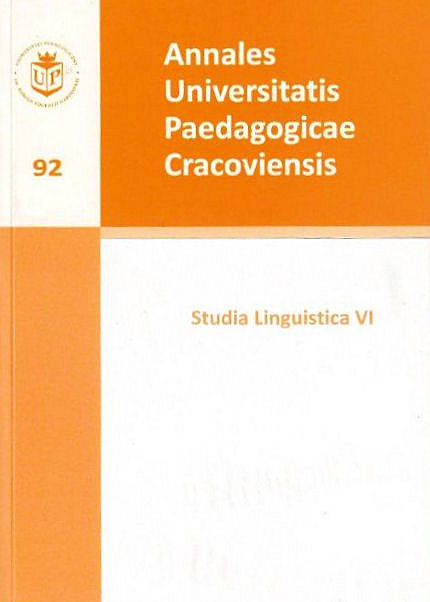Leksykalizacja wobec tradycji językowej
Main Article Content
Abstract
The paper concerns mutual relations between lexicalization processes and linguistic tradition. The author invokes Polish and foreign works and points to possible ways of understanding lexicalization by illustrating them with Polish linguistic material. The attention is focused on the diachronic approach to lexicalization processes. The aim of the article is to indicate linguistic processes which allow lexicalization to be treated as a phenomenon continuing the Polish lexical tradition (maintaining old meanings), or as a process causing the severance of etymological relations. The paper also stresses the importance of folk etymology as a process which can be interpreted as an attempt to build artificial etymological relations between lexemes.
Downloads
Article Details
Author, submitting a text to the editorial board of the journal “Annales Universitatis Paedagogicae Cracoviensis. Studia Linguistica", certifies that the content of the article has not been published so far and that the work does not violate in any way the copyright or related rights of other person, as well as other rights of third parties, and that no one's rights to the work (or any part thereof) have been missed. After signing the contract, the property rights to the published materials are transferred to the University of the National Education Commission, Krakow.
“Annales Universitatis Paedagogicae Cracoviensis. Studia Linguistica” is an open access journal, and all its content is made available free of charge to users and institutions under the Creative Commons CC-BY-NC-ND 4.0 license (attribution, non-commercial use, no derivative works). Under this license, the authors agree that their work may be lawfully reused for any purpose, except for commercial purposes, without the prior consent of the author or publisher. Everyone can read, download, copy, print, distribute and process these works, provided that the author's marking and the original publication place are correct. Published texts may not be used to create derivative works (e.g. to translate and publish in another language without the consent of the publisher). This is in line with the BOAI (Budapest Open Access Initiative) definition. "Studia Linguistica" does not charge for submitting or processing articles.
